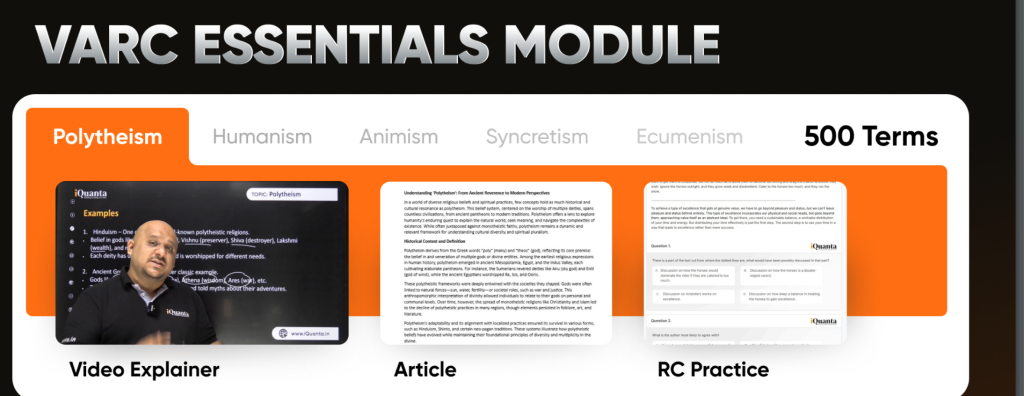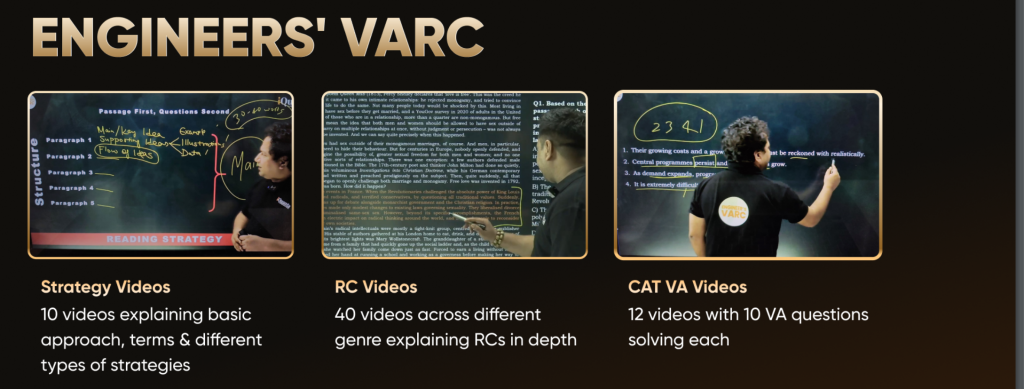With the increasing competition for CAT every year and number of test-takers touching almost 3 lacs now, you need to outperform others to secure a seat in one of the top B-Schools. While it is true that CAT preparation journey varies a lot from person to person and also changes based on current scenarios. However, one cannot negotiate the fact that building a solid foundation is one of the best ways to kickstart your preparation. You can have a different test-taking strategy from your friend but if you lack a good base, you will not be able to perform well in CAT 2025. When it comes to building the base, English and Math form the core of your preparation and is absolutely necessary for a good performance. This article will explore Why CAT 2025 Aspirants Should Focus on Building Strong Basics in Math and English. The article will further also build on telling how effectively you can prepare for these subjects and finally ace the CAT 2025 exam.
Join this free whatsapp group to get the latest information about CAT exam along with the strategies by CAT experts

CAT Exam: A Brief Overview
The CAT exam is divided into three key sections which are to test different skills of the candidates:
- Quantitative Aptitude (QA): As the name suggests, QA tries to test a candidate’s numerical ability and mathematical aptitude.
- Verbal Ability and Reading Comprehension (VARC): Evaluates your basic English language skills and ability to understand and interpret reading comprehension.
- Data Interpretation and Logical Reasoning (DILR): This section mix of analytical & logical reasoning abilities, along with the ability to draw meaningful conversation from data presented in different visual formats.
While each section is significant, the QA and VARC sections heavily depend on basic skills you may have developed during your school days. Unfortunately, many aspirants tend to overlook these foundational concepts in the race to solve more complex problems or just focus on mastering the shortcuts. However, we need to understand that CAT, by its very nature tests your foundational knowledge in a pre-specified time period.
Why Basics in Mathematics Matter for CAT Preparation 2025
Mathematics which is tested in the CAT exam is not just about some very advanced and complex topics or having tricky calculations. It is all about clear, logical thinking and the ability to use the basic concepts which you would have otherwise covered till date while preparing. Here is the list of reasons why foundational knowledge in math is essential:
Understanding Questions Efficiently in QA Section of CAT
The QA section in the CAT exam often includes problems hidden in simple concepts like percentages, ratios or time and work. If your basics are unclear or you missed covering something, even straightforward questions might seem very difficult to crack, and you would lose marks in sitter questions. For instance, solving a problem on compound interest will require a solid base of percentages and an understanding of exponential growth in general.
Speed and Accuracy in CAT
Many students build on the habit of relying on shortcuts without truly understanding the underlying concepts used in the questions. This mostly happens due to some form of peer pressure and trying to solve a question within a few seconds. While it is very true that these methods can save good amount of time, but they often then fail when questions are presented in an unconventional format, which are not seen before. A strong base in Maths will help you adapt quickly to any format of the question and help you solve problems with both speed and precision.
Logical Thinking
Remember that real math is not just about numbers, rather it is all about reasoning. Typical yet basic concepts like geometry or number systems try to train you to think logically and make connections between different factors. These skills that are totally invaluable not just in CAT but also in decision-making scenarios which you will surely encounter after joining a business school.
Reduced Anxiety
One of the common challenges that many aspirants face is the math anxiety. A lot of us will try to ignore math as much as possible and this habit costs a lot on the D-day. This often starts in your formative years due to ignorance of basic concepts. Therefore, revisiting these fundamentals will build confidence, reduce exam-day stress and will improve your overall performance.
Join this free whatsapp group to get the latest information about CAT exam along with the strategies by CAT experts

Fearing Quants? iQuanta’s Customised QA Module is for You
iQuanta has a tailored QA module for students who struggle in Maths and have not studied Mathematics after class 10. This video has 80+ hours videos on basic concept aligned with 6 to 10 NCERT Mathematics. This helps students in concept clarity and you’ll start loving to solve the Quants question. Since many aspirants are from non maths background so they might have forgotten the basic concepts such as linear equation, percentage, speed distance and time and many more. So this module will help you start your CAT 2025 preparation from the very basic.


Why English Basics is Important for CAT 2025?
Just like the above-mentioned category of aspirants, there are also a bunch of aspirants who often underestimate the VARC section. They assume their conversational fluency in English is enough and should help them ace the VARC section. The reality is far from this and you need to build your foundation if you want to score well in VARC. This is because the CAT exam demands a deeper understanding of the English Language, which starts with strengthening the basics, something which we had done back in our school days.
Comprehension is Key
A significant portion i.e., almost 67 percent of the VARC section is dominated by reading comprehension. To excel in this subpart, you need to build the ability to process information quickly, identify key arguments mentioned in the passages and finally infer the meanings from them. This is impossible to do so without an in-depth knowledge of vocabulary and a good hold on grammar. This section also requires understanding of sentence structures and how to build coherent meanings out of texts.
Critical Thinking
English is not just about understanding words and keep adding new words to your own dictionary. It is also about interpreting context, tone and intent from a given passage or paragraph. This is not possible overnight and will not happen easily. It requires a strong foundation in reading and analyzing diverse content. You can start by reading articles, editorials, and literary pieces from a variety of sources online.
Improved Communication Skills
For a while, let us try to think beyond CAT too. English proficiency is very essential for all the selection process that happens including the group discussions, written ability tests (WAT), personal interviews, and even in professional life in general. Building a strong base during your CAT preparation will help you equip with the right tools to articulate your thoughts clearly and concisely.
Avoiding Errors
The options in the VARC section are always very close and your slightest mistake can cost you a lot. These mistakes can easily be tackled if your base is solid, and you develop strong interpretation skills. Candidates often are able to eliminate two options but then get stuck with the remaining two options. A good foundation in English helps you there and improves your scores drastically.
Get a Strong Command Over VARC – iQuanta’s VARC Module is the Solution
This year VARC essentials has been launched to start right from level zero. It has 500 essential terms covering the entire spectrum of all the RC topics. It has the most important 500 terms and each of this term is covered with the help of a video, an article and RC.

The VARC module has been designed for the students who are weak in grammar and communication. This module has 40 videos on RC, 12 CAT VA videos with 10 VA questions, 7 strategy based videos. Apart from this you also get access to 60+ videos with 30 hours of VARC. The videos include 10 parajumbles, 10 para summary, 10 critical reasoning, 10 sentence correction, 10 fill in the blanks, 10 odd one out and the strategy video has RC reading strategy, PJ solving strategy, PS strategy, CR strategy, SC strategy, RC option elimination strategy and lastly fill in the blanks strategy.
The Importance of Balance – Maths and English Are Equally Important in CAT
The majority of the students might be naturally inclined toward either Math or English. But, performing well in CAT requires a balance of both. Here is how you can build a strong foundation in both subjects which eventually adds up to your overall preparation:
Cross-Skill Benefits
Logical reasoning, which is essentially used in math, often enhances analytical thinking ability in English. This is somewhat required for interpreting complex passages. Similarly, the clarity of thought that you get by reading comprehension helps in approaching QA problems. This helps in forming a good structure.
Boosting Overall Confidence for CAT
A balanced preparation is always better than relying a lot on any one section. Understand that CAT is somewhat unpredictable, and that one section can go against your way on the D-day. Therefore, it is better to have a balanced approach across all the sections to maximise scores while minimising risks.
Join the free CAT whatsapp group to get updated information about CAT along with preparation strategies and tips.
Adapting to Surprises
As discussed above, CAT is known for its unpredictability. You can easily encounter changes in patterns, a different form of questions or something way out of the defined syllabus. Try to have a good understanding of the basics and build a solid foundation to tackle them effectively.
iQuanta’s way to success
iQuanta has two highly curated modules to improve VARC for engineers and similarly, QA for non-engineers. The math module for non-engineers contains roughly 80+ hours with more than 100 videos. dedicated to Quants conceptual videos. It is well aligned with the class 6 to 10 NCERT syllabus. Similarly, the VARC module for engineers has 60+ videos having content worth 30 hours. It covers the syllabus well by dedicating 40 videos to RCs and the remaining to VA along with strategy-based videos.

How to Build Strong Basics in Maths and Vocab and Move to Advance Level – Your Entire Journey
Step 1 – As soon an you enroll to the iQuanta CAT course 2025 you will get access to your dashboard.
Step 2 – You get access to the core modules that will help you build a strong foundation.
Step 3 – You will be a part of the live classes where your CAT mentors will teach you every single concept and will solve the easy to moderate level problems.
Step 4 – After clearing the basic concept you will be a part of the application classes where you get 3-4 questions from each concept. Now you have to solve that question in 3-4 minutes and after that the solution appears on your screen.
Step 5 – You also get assignments for your daily practice. It has approximately 1200 Quants questions, 80+ RCs and 200+ VA Questions.
Step 6 – After this you move to the advance module where you get strategy video. In the VARC module you get 10 videos that will explain the basic approach, terms and different types of strategy. It has 40 videos across different genre that explains RCs in depth. Along with this you get 12 videos with 10 VA questions with the detailed solution.

Step 7 – The advance level CAT quants module will have 90+ videos that will cover CAT level concepts along with CAT practice questions. It will also have detailed explanation of concepts and questions with illustrative examples.

Join the Largest CAT Preparation Community in India

iQuanta CAT Course 2025





